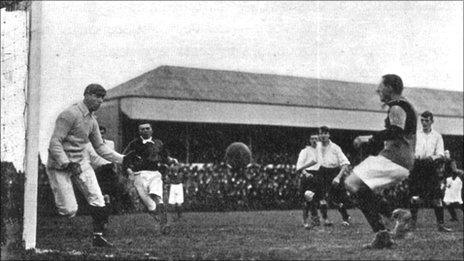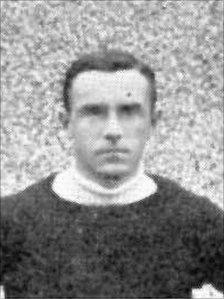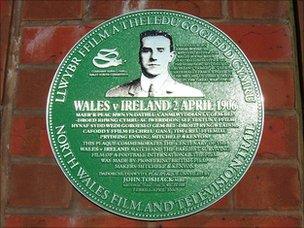Football's 'forgotten hero' Leigh Richmond Roose
- Published

Welsh goalkeeper Leigh Richmond Roose in action for Stoke in around 1904
You could be forgiven for skipping over yet another article talking about a talented international goalkeeper who courts the cameras, dates the trendiest singers, lands himself in hot water through his bad behaviour and gets big money.
But you might take a second glance when you notice that the footballer in question isn't playing in 2011, but in 1911.
Leigh Richmond Roose was born in Holt near Wrexham on 27 November 1877, and died during the Battle of The Somme, aged 38, in October 1916.
His biographer calls him a "forgotten hero" and the game's "first superstar".
Roose started his amateur career at Aberystwyth Town in 1895, while studying medicine at the university there.
But within two seasons Roose became famous throughout Wales, both for his keeping, and his crowd-pleasing antics.
He would turn his back on play to tell jokes to the fans, and perform gymnastics from the goal crossbar while the ball was at the other end of the field.
Physical specimen
By 1900, he'd led Aberystwyth to the Welsh Cup, and earned an international call-up
It also brought him to the attention of English First Division clubs, seeing him play for Stoke City, Everton, Sunderland, Celtic, Aston Villa and Woolwich Arsenal.
His biographer, Spencer Vignes, explained the Football Association was even forced to change the rules of the game because of him.

Leigh Richmond Roose told jokes to fans behind his goal
"Leigh revolutionised the way the game was played in England. Before Leigh, goalkeepers were just shot-stoppers, if they came off their line they had no protection from being punched, shoulder-charged and trampled by the forwards, in a game which was vastly more physical than today.
"Usually they were too terrified to come out of their goal, even though - in those days - they were allowed to handle the ball anywhere in their own half of the field."
"But Leigh was such a physical specimen that he could take on the forwards at their own game.
"He'd flatten the striker, catch the ball, and carry play up field like a rugby fullback does today. So in 1912, at the end of his career, the rules were changed so that keepers could only handle the ball inside the penalty area."
Practical jokes
But Mr Vignes said the FA was not a fan of Roose.
"They hated him every bit as much as the fans loved him. He insisted on staying amateur, playing practical jokes and larking around at a time when the FA were trying to portray football as a serious professional sport."
"Leigh was also a bit of a London socialite, and made as many headlines off the field as on it; something else which didn't go down too well with the FA"
In 1909 the FA launched an investigation into the expenses Roose, as an amateur, was claiming from his then club, Sunderland.
As an amateur, he could not be paid for playing, but received more in expenses than his team-mates earned professionally.
According to Mr Vignes, the FA's concerns weren't entirely unmerited.
When Roose missed his train from Euston for a 1906 Stoke match away to Aston Villa, he hired his own locomotive and carriage, and sent the £31 bill to his club; this at a time when a miner would earn around £1, three shillings a week.
Yet Roose's clubs considered it money well spent.
"You have to remember that the people who run football clubs are businessmen. If Leigh was getting £1,000 a season in expenses, then you can be sure that the clubs were making £2,000 a season through the turnstiles and in extra publicity."
Eligible bachelor
"He was the first football superstar, with the playing style of Peter Schmiechel, the bon viveur attitude of George Best, and the media-savvy sense of David Beckham."
"People who'd never watched football in their life knew who he was, children chased his carriage, and women hung around his hotel for the chance to spend a night with him."
Among those women was music hall star Marie Lloyd, who popularised the song My Old Man Said Follow The Van.
Their relationship - Lloyd was married at the time - caused a media storm, displeasing the FA, but only serving to enhance Roose's popularity.
In 1905 The Daily Mail listed Roose as London's second most eligible bachelor, behind cricketing legend Jack Hobbs.
When the paper invited readers to vote for players in a World XI, Roose won the goalkeeper's spot by a landslide.
Forgotten hero

Roose is commemorated by a plaque on the Pryce Griffiths stand at Wrexham's Racecourse ground
One hundred years ago, Roose ended his playing career with Arsenal, having never properly recovered from a broken wrist two years before.
When war broke out in 1914, he joined the Royal Army Medical Corps, despite having never completed his medicine degree.
Later he transferred to the Royal Fusiliers and served in the trenches at the Battle of The Somme in 1916.
He earned the Military Medal for using his goalkeeping skills to fend off a flame-thrower attack on his unit, by hurling grenades into the enemy.
But just weeks after learning of the honour, Roose was killed on 7 October, 1916.
Details about his death had remained a mystery until Mr Vignes researched his biography.
"Nobody knew exactly what had happened, Leigh had simply vanished from the official records."
"It was only after studying the war memorial to the Somme victims at Theipval, that I discovered that he is listed on there, but as 'Corporal Rouse', not 'Corporal Roose."
"I don't know why Leigh is largely a forgotten hero nowadays, his life had all the ingredients to make him a legend a century on."